annual report1-final.qxd - Overseas Indian
annual report1-final.qxd - Overseas Indian
annual report1-final.qxd - Overseas Indian
Create successful ePaper yourself
Turn your PDF publications into a flip-book with our unique Google optimized e-Paper software.
Plenary Session 5<br />
Panelists at the plenary session on ‘Diaspora Knowledge Network’ in Hyderabad on January 8, 2006.<br />
Chair:<br />
Opening Remarks:<br />
Speakers:<br />
PLENARY V<br />
DIASPORA KNOWLEDGE NETWORK<br />
Montek Singh Ahluwalia,<br />
Deputy Chairman,<br />
Planning Commission<br />
S. Krishna Kumar<br />
Secretary, MOIA.<br />
Abdul Waheed Khan,<br />
ADG for Communication and<br />
Information, UNESCO<br />
Steve Glovinski,<br />
Consultant, UNDP<br />
Alok Srivastava,<br />
Consultant, UNDP<br />
Ravi Seethapathy,<br />
Chair, Shastri Indo-Canadian<br />
Institute<br />
Dr. N.S. Rajendran,<br />
Secretary, Youth Affairs,<br />
Malaysia<br />
Ramalinga Raju,<br />
Chairman, Satyam Computers<br />
Ahluwalia elaborated on the idea of starting<br />
knowledge networks by developing a database of<br />
experts in various fields. Citing the alumni network<br />
of IITs as an example, he said that there was a need<br />
now for an umbrella network to enhance the potential<br />
of such networks. He referred to the model and<br />
idea that the UNDP office in New Delhi was working<br />
on with respect to realisation of the Millennium<br />
Development Goals (MDGs). He emphasised the<br />
need for sustainable traffic among the networks.<br />
Dr. Abdul Waheed Khan, Assistant Director<br />
General, Communication and Information, UNESCO,<br />
in his presentation, referred to the importance of such<br />
networks by highlighting the fact that an international<br />
news magazine had a cover story on the topic in its<br />
latest issue. He mentioned the problems of poverty<br />
and the digital divide which restricted the growth of<br />
knowledge societies. He stressed that networks<br />
should be inclusive in nature. Freedom of expression,<br />
access and respect for cultural diversity were essential.<br />
India had an important place and role to play in the<br />
knowledge era. Advantages such as proficiency in<br />
English language, edge in IT, a strong learning tradition<br />
and spread of a rich <strong>Indian</strong> knowledge diaspora<br />
across the world were listed. He said that given these<br />
advantages, the question should be: “How can our<br />
diaspora invest their knowledge in our country”<br />
Though brain drain was often mentioned, Dr. Khan<br />
said that brain gain had to be recognised as well. The<br />
ideas of President Dr. A.P.J. Abdul Kalam were cited<br />
to emphasise the point. Information and communication<br />
technology (ICT) had a major role in knowledge<br />
29


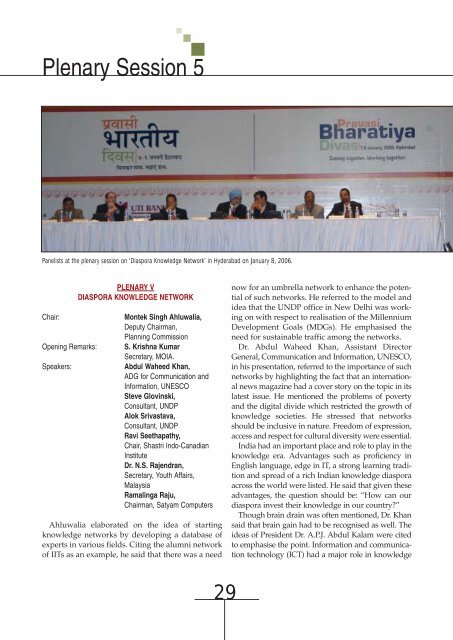
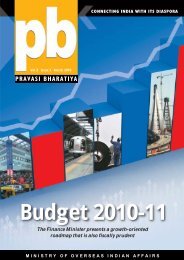
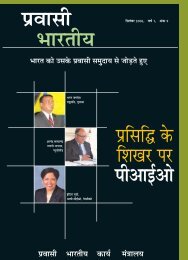

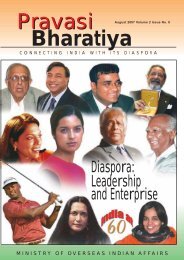
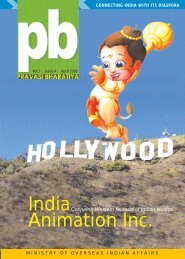
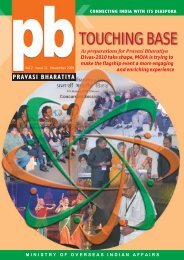
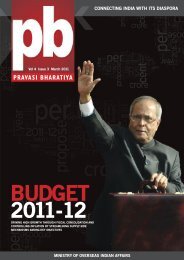
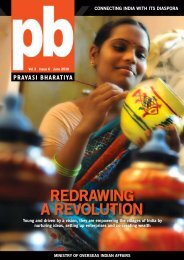
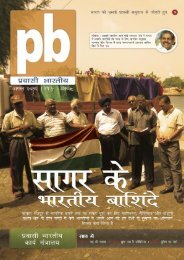

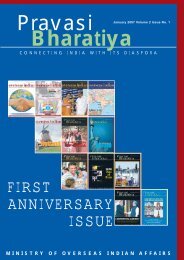
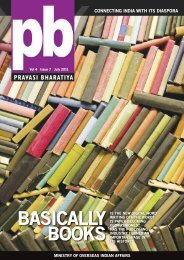
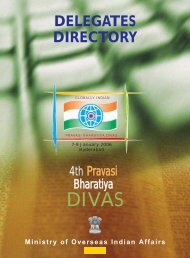
![flaxkiqj feuh izoklh Hkkjrh; fnol] vDVwcj 9&11 - Overseas Indian](https://img.yumpu.com/43977040/1/184x260/flaxkiqj-feuh-izoklh-hkkjrh-fnol-vdvwcj-911-overseas-indian.jpg?quality=85)
